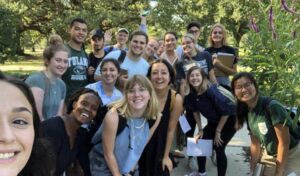Diversity of Life (EBIO 1010). The planet Earth, our planet, hosts an amazing diversity of life. How are there so many different life forms? How do we observe, understand, and organize them? Where do they fit in, and why should we care? In this course we will explore concepts, processes, and problems related to evolution, ecology, behavior, conservation, and human health using case studies from major groups of organisms.
Entomology (EBIO 4430/6430). Insects are very important to life on planet Earth for so many reasons. Insects are the most diverse class of organisms on the planet and play a major role its ecosystem functions and processes. In this course, we will explore insect anatomy, morphology, classification, diversity, evolution, ecology, behavior, and insect conservation. This will be achieved through lectures, discussions, case studies, laboratory activities, insect collections, field trips, and guest lectures.
Insects and Human Interactions (EBIO 2210). This course is an introduction to the ecology and evolution of insects. The course will focus heavily on interactions between humans and insects, both historically and in modern times. A goal of the course is that you will develop the foundation and tools you need to continue learning about the importance of insects, their impacts on human society and/or other environmental issues of importance to you. The course has an optional tier 1 service-learning component. See the service-learning syllabus for information.
of insects, their impacts on human society and/or other environmental issues of importance to you. The course has an optional tier 1 service-learning component. See the service-learning syllabus for information.
Plant Biology and Adaptation (EBIO 3590/6590). Plant biology and adaptation is an advanced undergraduate and graduate level (4 credit) course that introduces students to the biology and evolutionary processes that led to the diversification of the different plant groups. The course will cover key physiological, anatomical, morphological, ecological and evolutionary aspects that favored plant adaptation across different ecosystems and will link these concepts with the current challenges faced by the different plant groups due to climate change. Course material integrates basic field and laboratory experiments with case studies to demonstrate these concepts.
Plants and Human Affairs (EBIO 3180/6180) is designed to introduce you to plants, how different plants and plant products have shaped human existence. Human communities have been influenced by plants, nations have been defined by plants and so have tribes both present and past. We will explore plant biology, plant history, plant domestication, and plant products as it relates to humans and society, through lectures, readings, discussions and lab activities for those who are taking the lab.
Urban Agroecology and Sustainability in New Orleans (EBIO 4440) is a project centered 3-credit undergraduate course. The is a course designed for students from all disciplines with a general interest in urban agriculture, ecology and sustainable food production systems. This course will provide a socio-ecological approach to the study of urban food production, by evaluating the pressures driving biodiversity, energy cycling conservation, job creation, human health and well-being. The core of this course will be on vegetable and fruit production in urban landscape with the four principles of agroecology in practice. This course will be very interactive and hands-on where students will put theory into practice and service.

Urban Agroecology and Sustainability in New Orleans course, will use urban gardening to get hands on experience in food production while addressing a range of food security and ecological issues in New Orleans. Throughout the semester, we will discuss in detail the principles of agroecology as well as topics such as current community food production practices in New Orleans, local access to healthy and culturally appropriate food, the relationship between living conditions and food production, food cultivation, soil health and biodiversity, and impacts of urban agriculture on species interactions. In practice, students will adopt and maintain a community garden, interact with the community, grow produce, apply problem solving skills, teamwork, and critical thinking.